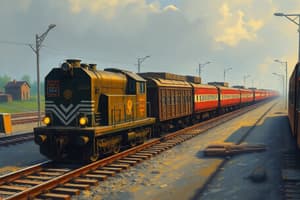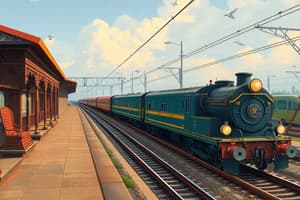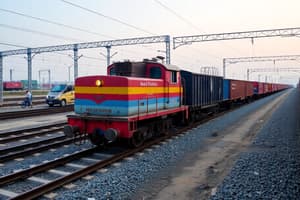Podcast
Questions and Answers
What benefit does automation provide for rail logistics tasks?
What benefit does automation provide for rail logistics tasks?
- Enhances scheduling and routing efficiency (correct)
- Complicates dispatching processes
- Eliminates the need for real-time tracking
- Increases manual labor requirements
How can blockchain technology enhance rail logistics?
How can blockchain technology enhance rail logistics?
- By preventing any changes in shipment data
- By tracking the historical pricing of goods
- By facilitating secure transactions among stakeholders (correct)
- By automating all logistics processes completely
What role does the IoT play in rail logistics operations?
What role does the IoT play in rail logistics operations?
- It primarily serves as an entertainment system
- It solely tracks the weather conditions
- It allows for monitoring equipment performance (correct)
- It complicates the tracking of freight shipments
What are some challenges faced by the rail logistics industry?
What are some challenges faced by the rail logistics industry?
Which of the following contributes to sustainable rail logistics?
Which of the following contributes to sustainable rail logistics?
What is the term for the system used to plan and manage rail freight shipments through a terminal?
What is the term for the system used to plan and manage rail freight shipments through a terminal?
Which term refers to using data and analytics to forecast demand for rail freight transportation?
Which term refers to using data and analytics to forecast demand for rail freight transportation?
How can rail logistics companies effectively reduce their carbon footprint?
How can rail logistics companies effectively reduce their carbon footprint?
What term describes the practice of transporting environmentally sustainable goods via rail?
What term describes the practice of transporting environmentally sustainable goods via rail?
In what way can rail logistics support the circular economy?
In what way can rail logistics support the circular economy?
What is the primary goal of rail logistics?
What is the primary goal of rail logistics?
What future trend is shaping rail logistics?
What future trend is shaping rail logistics?
What term is used to describe the transportation of goods for e-commerce retailers via rail?
What term is used to describe the transportation of goods for e-commerce retailers via rail?
Which of the following trends in rail logistics involves transferring goods from urban to rural areas?
Which of the following trends in rail logistics involves transferring goods from urban to rural areas?
What is considered the future trend in rail logistics?
What is considered the future trend in rail logistics?
Which technology is anticipated to have a significant impact on rail logistics?
Which technology is anticipated to have a significant impact on rail logistics?
What term describes the process of using rail logistics to transport goods directly from the supplier to the customer, without warehousing?
What term describes the process of using rail logistics to transport goods directly from the supplier to the customer, without warehousing?
Which of the following best describes the process of transferring goods between different modes of transportation, such as rail and truck?
Which of the following best describes the process of transferring goods between different modes of transportation, such as rail and truck?
What system is specifically designed to track the location and status of rail freight shipments?
What system is specifically designed to track the location and status of rail freight shipments?
What is the umbrella term for using data and analytics to enhance rail logistics operations?
What is the umbrella term for using data and analytics to enhance rail logistics operations?
What term is used for the system that schedules and manages rail freight movements?
What term is used for the system that schedules and manages rail freight movements?
What term refers to rail logistics used for transporting high-value goods like electronics?
What term refers to rail logistics used for transporting high-value goods like electronics?
What system is implemented to manage the financial considerations in rail logistics?
What system is implemented to manage the financial considerations in rail logistics?
Which term refers to the arrangement of moving goods seamlessly between railway companies?
Which term refers to the arrangement of moving goods seamlessly between railway companies?
What is a significant role of the rail logistics industry in the global economy?
What is a significant role of the rail logistics industry in the global economy?
Which of the following is NOT a key challenge currently facing the rail logistics industry?
Which of the following is NOT a key challenge currently facing the rail logistics industry?
Which technology is contributing significantly to the transformation of the rail logistics industry?
Which technology is contributing significantly to the transformation of the rail logistics industry?
What can governments do to enhance the rail logistics industry's development?
What can governments do to enhance the rail logistics industry's development?
How does rail logistics contribute to a sustainable economy?
How does rail logistics contribute to a sustainable economy?
What is one primary challenge associated with implementing sustainable rail logistics practices?
What is one primary challenge associated with implementing sustainable rail logistics practices?
Which technology is anticipated to notably enhance sustainability in rail logistics?
Which technology is anticipated to notably enhance sustainability in rail logistics?
How does AI contribute to making rail logistics more sustainable?
How does AI contribute to making rail logistics more sustainable?
What role do governmental actions play in the future of sustainable rail logistics?
What role do governmental actions play in the future of sustainable rail logistics?
In what way can autonomous trains contribute to the sustainability efforts of rail logistics?
In what way can autonomous trains contribute to the sustainability efforts of rail logistics?
What is a significant trend influencing the push for sustainable rail logistics?
What is a significant trend influencing the push for sustainable rail logistics?
Which of the following challenges is the rail logistics industry likely to confront regarding sustainability?
Which of the following challenges is the rail logistics industry likely to confront regarding sustainability?
How can battery-powered locomotives enhance the sustainability of rail logistics?
How can battery-powered locomotives enhance the sustainability of rail logistics?
Flashcards
Freight tracking system
Freight tracking system
A system that tracks the location and status of rail freight shipments.
Loading/unloading system
Loading/unloading system
A system that loads and unloads rail freight cars.
Intermodal transportation
Intermodal transportation
Processes that involve transferring goods between different modes of transportation.
Transportation management system
Transportation management system
Signup and view all the flashcards
Rail logistics optimization
Rail logistics optimization
Signup and view all the flashcards
Premium rail logistics
Premium rail logistics
Signup and view all the flashcards
Direct rail logistics
Direct rail logistics
Signup and view all the flashcards
Rail logistics finance system
Rail logistics finance system
Signup and view all the flashcards
Rail logistics visibility
Rail logistics visibility
Signup and view all the flashcards
Green rail logistics
Green rail logistics
Signup and view all the flashcards
Terminal operating system (TOS)
Terminal operating system (TOS)
Signup and view all the flashcards
Rail freight forecasting
Rail freight forecasting
Signup and view all the flashcards
E-commerce rail logistics
E-commerce rail logistics
Signup and view all the flashcards
Last-mile rail logistics
Last-mile rail logistics
Signup and view all the flashcards
Artificial intelligence (AI)
Artificial intelligence (AI)
Signup and view all the flashcards
Blockchain
Blockchain
Signup and view all the flashcards
Internet of things (IoT)
Internet of things (IoT)
Signup and view all the flashcards
Sustainable rail logistics practices
Sustainable rail logistics practices
Signup and view all the flashcards
Reducing carbon footprint
Reducing carbon footprint
Signup and view all the flashcards
Supporting the circular economy
Supporting the circular economy
Signup and view all the flashcards
Trends shaping the future of rail logistics
Trends shaping the future of rail logistics
Signup and view all the flashcards
Rail logistics and smart cities
Rail logistics and smart cities
Signup and view all the flashcards
Benefits of sustainable rail logistics
Benefits of sustainable rail logistics
Signup and view all the flashcards
Challenges of sustainable rail logistics
Challenges of sustainable rail logistics
Signup and view all the flashcards
The future of sustainable rail logistics
The future of sustainable rail logistics
Signup and view all the flashcards
Technologies impacting sustainable rail logistics
Technologies impacting sustainable rail logistics
Signup and view all the flashcards
Challenges of sustainable rail logistics for the future
Challenges of sustainable rail logistics for the future
Signup and view all the flashcards
Trends driving the development of sustainable rail logistics
Trends driving the development of sustainable rail logistics
Signup and view all the flashcards
The role of the rail logistics industry in the global economy
The role of the rail logistics industry in the global economy
Signup and view all the flashcards
Key technologies transforming the rail logistics industry
Key technologies transforming the rail logistics industry
Signup and view all the flashcards
Government support for the rail logistics industry
Government support for the rail logistics industry
Signup and view all the flashcards
The role of rail logistics in a sustainable economy
The role of rail logistics in a sustainable economy
Signup and view all the flashcards
The future of rail logistics
The future of rail logistics
Signup and view all the flashcards
Study Notes
Rail Logistics Terminology
- Interchange service, intermodal service, and through service are all terms used for railway services designed to transport goods between different railway companies.
- Freight tracking system, transportation management system, and supply chain management system are all terms used for systems that track the location and status of rail freight shipments.
- Loading/unloading system, material handling system, and intermodal transfer system are all terms used for systems that load and unload rail freight cars.
- Intermodal transportation, cross-docking, and last-mile delivery are all terms for processes that involve transferring goods between different modes of transportation.
- Transportation management system, supply chain management system, and rail operating system are all terms used for systems that schedule and manage the movement of rail freight shipments.
- Rail logistics optimization, rail intelligence, and rail analytics are all terms for processes that use data and analytics to improve the efficiency and effectiveness of rail logistics operations.
- Premium rail logistics, high-value rail logistics, and expedited rail logistics are all terms for the trend of using rail logistics to transport high-value goods.
- Direct rail logistics, door-to-door rail logistics, and just-in-time (JIT) rail logistics are all terms for the process of using rail logistics to transport goods directly from the supplier to the customer, without the need for warehousing.
- Rail logistics finance system, transportation management system, and enterprise resource planning (ERP) system are all terms used for systems that manage the financial aspects of rail logistics operations.
- Rail logistics visibility, rail logistics collaboration, and rail logistics interoperability are all terms for using technology to improve communication and collaboration between different stakeholders in the rail logistics supply chain.
- Green rail logistics, sustainable rail logistics, and environmental rail logistics are all terms for the trend of using rail logistics to transport sustainable and environmentally friendly goods.
- To provide a safe, efficient, and cost-effective means of transporting goods, to meet the needs of customers and stakeholders, and to support economic growth and development are all goals of rail logistics.
- Terminal operating system (TOS), yard management system (YMS), and rail freight management system (RFMS) are all terms for systems that plan and manage the movement of rail freight shipments through a terminal.
- Rail freight forecasting, rail freight demand planning, and rail freight capacity planning are all terms for processes that use data and analytics to predict the demand for rail freight transportation.
- E-commerce rail logistics, last-mile rail logistics, and parcel rail logistics are all terms for the process of using rail logistics to transport goods for e-commerce retailers.
- Last-mile rail logistics, rural rail logistics, and access rail logistics are all terms for the trend of using rail logistics to transport goods from urban areas to rural areas.
- Smart rail logistics, digital rail logistics, and sustainable rail logistics are all terms for the future of rail logistics.
Technologies Impacting the Future of Rail Logistics
- Artificial intelligence (AI), blockchain, and the internet of things (IoT) are all technologies that are expected to have a major impact on the future of rail logistics.
- AI can automate tasks like scheduling, routing, and dispatching; predict demand and optimize capacity; and improve the maintenance and reliability of rail equipment.
- Blockchain can track the movement of goods in real-time, facilitate secure transactions between different stakeholders, and automate dispute resolution.
- The IoT can track the location and condition of rail freight shipments; monitor the performance of rail equipment; and collect data on environmental conditions.
Challenges Facing The Rail Logistics Industry
- Increasing competition from other modes of transportation, the need to invest in new technologies, and the impact of climate change are all challenges facing the rail logistics industry.
Sustainable Rail Logistics
- Using energy-efficient locomotives, reducing waste and emissions, and transporting sustainable goods are all sustainable rail logistics practices.
- Switching to renewable energy sources, investing in energy-efficient locomotives and equipment, and improving the efficiency of their operations are all ways rail logistics companies can reduce their carbon footprint.
- Transporting recycled materials, providing reverse logistics services, and working with customers to develop sustainable supply chains are all ways rail logistics companies can support the transition to a circular economy.
Trends Shaping The Future of Rail Logistics
- The rise of e-commerce, the growth of the global economy, and the increasing focus on sustainability are all trends shaping the future of rail logistics.
Rail Logistics and Smart Cities
- Rail logistics can help to reduce congestion and pollution in urban areas, improve the efficiency of urban supply chains, and make cities more livable and sustainable.
Benefits of Sustainable Rail Logistics
- Sustainable rail logistics practices increase profitability, improve efficiencies, and minimize environmental impact.
Challenges of Implementing Sustainable Rail Logistics Practices
- High upfront costs, lack of standardized practices and technologies, and resistance to change from stakeholders are all challenges of implementing sustainable rail logistics practices.
The Future of Sustainable Rail Logistics
- Sustainable rail logistics will become increasingly important as the world transitions to a sustainable economy.
- Rail logistics companies will invest more heavily in sustainable technologies and practices.
- Governments will provide financial and regulatory support for the development of sustainable rail logistics.
Technologies Impacting Sustainable Rail Logistics
- Autonomous trains, battery-powered locomotives, and artificial intelligence (AI) are all technologies that are expected to have a major impact on the future of sustainable rail logistics.
- AI can optimize train schedules and routes, predict demand and reduce empty hauls, and improve the maintenance and reliability of rail equipment.
- Autonomous trains can reduce fuel consumption, improve safety and efficiency, and reduce emissions.
- Battery-powered locomotives can reduce emissions, reduce noise pollution, and improve energy efficiency.
Challenges of Sustainable Rail Logistics for The Future
- Reducing greenhouse gas emissions, adapting to the impacts of climate change, and sourcing sustainable energy sources are all challenges the rail logistics industry will face in the future in terms of sustainability.
Trends Driving the Development of Sustainable Rail Logistics
- The increasing demand for sustainable goods, the growing awareness of the environmental impact of transportation, and the development of new sustainable technologies are all trends driving the development of sustainable rail logistics.
The Role of the Rail Logistics Industry in the Global Economy
- Rail logistics plays a crucial role in transporting goods between countries, supporting the growth of international trade, and connecting businesses with their global supply chains.
Key Technologies Transforming The Rail Logistics Industry
- Artificial intelligence (AI), blockchain, and the internet of things (IoT) are all technologies that are transforming the rail logistics industry.
Government Support for the Rail Logistics Industry
- Investing in rail infrastructure, deregulating the rail industry, and providing financial incentives for businesses to use rail logistics are all things governments can do to support the growth and development of the rail logistics industry.
The Role of Rail Logistics in a Sustainable Economy
- Rail logistics can reduce greenhouse gas emissions, improve air quality, and reduce noise pollution, thus supporting the transition to a sustainable economy.
The Future of Rail Logistics
- Rail logistics will become increasingly important in the global economy.
- Rail logistics companies will invest more heavily in new technologies and sustainable practices.
- Governments will provide more financial and regulatory support for the development of rail logistics.
Studying That Suits You
Use AI to generate personalized quizzes and flashcards to suit your learning preferences.



